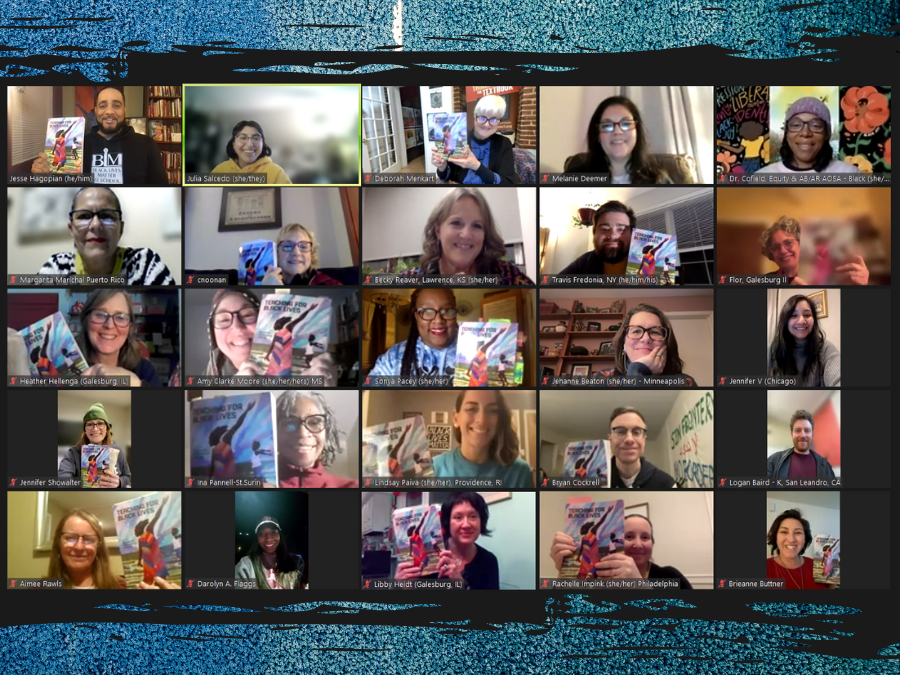
In January, the Zinn Education Project (ZEP) hosted a planning workshop for Teaching for Black Lives study groups to provide ideas on ways to participate in the Black Lives Matter at School Week of Action, February 5–9, 2024.
Black Lives Matter at School coordinating committee member and Teaching for Black Lives co-editor, Jesse Hagopian, facilitated the workshop. He opened with Donovan Livingston’s spoken word poem, “Lift-Off,” and asked participants to share some their favorite lines to in the chat:
Our stories are our ladders . . . So climb and grab them.
telling them education is the key / While you continue to change the locks.
An injustice is telling them they are stars/ Without acknowledging night that surrounds them.
Hagopian described the origins of the Black Lives Matter at School movement, how it has evolved over the years, and the 13 Guiding Principles.
Two alumni study group coordinators shared what their groups organized for Black Lives Matter at School Week of Action last year. Watch the two video clips below.
Becky Reaver
Lawrence, Kansas
Dr. Candace Cofield
Hayward, California
Educators reviewed an organizing template. In the workshop, they focused on two key questions:
- Who are your allies?
- What level of participation are you planning for?
Hagopian opened the rest of the time for questions and ahas. Ina Pannell-SaintSurin, study group coordinator from Brooklyn, New York, said,
As an aha from a couple of years ago, there was a fifth grade student in our school who wanted to recognize Trayvon Martin’s birthday because it fell within the week of action. In solidarity, we all wore hoodies to school that day. His birthday is February 5th which is the first day of the week of action this year. It might be a nice way to kick it off, if schools wanted to rally around wearing hoodies in honor of Trayvon Martin’s birthday.
One participant commented in the chat: I would love to hear your insights about building a movement against high stakes testing. Our school literally has testing during Black Lives Matter at school week of action this year. Hagopian responded,
Once you know that the origins of high-stakes standardized testing came out of the eugenics movement — it was open, white supremacists who brought these tests into the public schools in a conscious effort to rank and sort the races — you can see why resisting these standardized tests is part of teaching for Black Lives. We know today, all the research has shown over and over and over again that what high-stakes standardized tests measure most is your access to resources. They’re most correlated with your zip code, the income level in your community, not with your intelligence or what you’ve learned.
At Garfield High School where I’ve taught for a long time, we actually voted as a faculty to refuse to give the MAP test and our faculty was threatened with a 10 day suspension without pay by the superintendent. Every single teacher refused to give a test that we knew was draining resources, costing us millions of dollars. The student body government supported us and the PTA supported us. People all over the country wrote letters and by the end of the school year not only did they not suspend any teachers but they got rid of the test altogether for all of Seattle’s high schools because the movement spread to other schools as well.
You can resist these tests. Help students and parents understand they can opt out of tests. You can hold forums about the origins of high stakes standardized testing. You can go to your union and pass resolutions that the union needs to put out information about how to opt out. When you’ve collectively organized the faculty, sometimes you can even boycott them all together.
Read key takeaways from workshop participants below.
Join the Black Lives Matter at School movement and share your teaching stories and resources.
Additional resources:
- Black Lives Matter at School’s 13 Guiding Principles
- Early Childhood & Elementary Resources
- Resources for Middle and High School
- Black Lives Matter at School Video
- Examples of Week of Action lessons, activities, and events from D.C. Area Educators for Social Justice, Hayward Unified School District, Cordley Elementary, and in Rethinking Schools, Choreographing for Justice
- Organizing Template for planning with your team (you’ll be prompted to make a copy)
- Black Lives Matter at School Booklist from Social Justice Books
- Trayvon Martin Memorial Day at a school in D.C.
- “Testing, Tracking, and Toeing the Line: A Role Play on the Origins of the Modern High School” by Bill Bigelow

